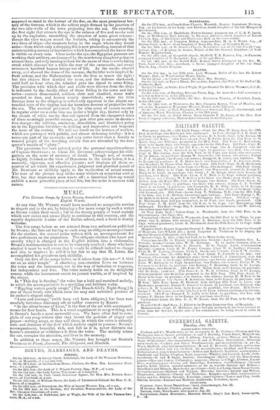MUSIC.
Five German Songs, by Louis Scone, translated or adapted to English Words.
At any time Mr. WESSEL would have rendered an acceptable service to singers and to the art, by bringing a few more songs by such a writer as SP0HR within their reach ; but in the dreary penury of vocal melody which now exists and seems likely to continue in this country, and the equally deplorable Latrine of the Italian school, such a boon is doubly welcome.
The five songs before ns are selected from two collections published
by SPOHR ; the first set having to each song an obligato accompaniment for the clarinet, the second series written with an accompaniment for two performers on the pianoforte. The obligato clarinet (we know not exactly why) is changed in the English edition into a violoncello. SPUTA'S instrumentation is not to be wantonly touched : those who have studied it must be well aware that it would be difficult indeed to change and also to improve it : still it is but fair to say that M. LIDEL has accomplished his gratuitous task skilfully.
Only the first of the songs before us is taken from this set—" A bird
sat on an alder bough." A charming conversation flows on between the voice and the instrument, not in the way of imitation or response, but independent and free. The voice melody holds on its delightful course, while the instrument carols its jocund warble, as if inspired by the singer.
In " This day is Sunday," the voice has a bold and sustained melody, to which the accompaniment is a sparkling and brilliant waltz. "Rippling waters gently swept," (The Bleach-Girl's Night-Song,) is one of those lovely airs which seem the easy and unbidden product of its author's elegant mind. "Love and courage," (with harp and horn obligato,) has been suc- cessfully introduce dintomny ofo ur raHer concerts by KROFF. "In the silver beams of Luna," is the first of the set with accompani-
ments for four bands. This is a vocal experiment in song-writing, and in SPOHR'S hands a most successful one. We have often had to com- plain of our song-writers that they invert the position of singer and player—writing songs, as they call them, in which the voice is subordi- nate, and destitute of the flow which melody ought to possess : Srottrt's accompaniment, beautiful, rich, and full as it is, never distracts the hearer's attention or withdraws it from the voice. The melody seizes the ear, occupies the attention, and lives in the memory.
In addition to these songs, Mr. WESSEL has brought out SPOHR'S Overtures to Faust, Jessonda, The Alchymist, and Macbeth.


























 Previous page
Previous page